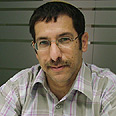Let’s go straight to the main course: When I see, on television, some kind of chef pouring sour cream into his meat dish, I am overcome by disgust and repugnance. Disgust, because my strictly kosher education identifies (erroneously, apparently) non-kosher food as something inedible, and repugnance because I find it extremely impolite to see non-kosher cuisine being openly displayed on a major Israeli television channel.
Yet let’s talk about television. This is the new public space that sets the trend; it’s everyone’s plate. The fact that on commercial television, in primetime, we have a cooking contest featuring non-kosher food as something that is taken for granted is problematic.
However, when it comes to eating kosher, I drop my argument. Anyone can cook and eat whatever he or she wish at their home, restaurant, and even on their food channel. What people put on their plate is none of my business.
Facts & Figures
Survey conducted for progressive Judaism movement shows 47 percent of secular families never light Shabbat candles, 67 percent of traditional Jews got to synagogue regularly
A large majority of the Jewish public adheres to basic kashrut laws. A large majority of Jews in Israel do not eat pork, do not touch shrimp, and even separate milk and meat. And what’s more: To the masses of people who keep kosher, the sight of chefs preparing non-kosher foods and devouring them openly on major TV channels is a difficult sight, no less. This is truly not something that should be taken for granted.
There are people who call television stations every time they see someone in a car not wearing a seatbelt; some people get upset by chauvinistic commercials; meanwhile, television channels have been making sure for years now not to show cigarette smoke on screen. This isn’t because of the law, but rather, because television officials realized that they also have an educational role to play in the fight against smoking and have turned “smoking on TV” into something unaesthetic.
But what about eating kosher? This is a whole different story. Food shows on television, and most certainly reality cooking shows, are produced by two ultra-secular groups. One is made up of television show creators, and the other comprises the chefs themselves. Members of both these groups are usually devout seculars. They view themselves, both professionally and as part of their personal identity, as part of the Western, liberal, and progressive world. A world where one cooks and eats whatever he or she feels like and anything that moves.
They snort with contempt in the face of these kinds of arguments and disregard a huge public that is bothered by blatantly open displays of non-kosher food. Members of the minority who do not adhere to kashrut laws view this as the eating-and-religious-disorder of a conservative public, rather than as part of a comprehensive culture that includes symbols and mitzvahs. On the other hand, they view their own cuisine and television as part of a progressive and liberated culture.
Annoying deception
The liberal worldview has an important rule: You eat whatever you wish, and we shall cook and display whatever we wish. “Our freedom of cooking,” say the chefs and television officials, “should not be hurting your feelings, dear viewers. If you decided to be primitive Jews, eat tasteless meat, and wait 200 hours between eating steak and dairy dessert it’s very nice, but it has nothing to do with us. We’re professionals. We’re professional cooks committed to global standards, and the world eats non-kosher food.”This debate then is not about kashrut, but rather, about politeness and good manners. It’s not a question of what one cooks, but rather, what one cooks on television; because the cooking is theirs, but television belongs to all of us.
Television’s attitude to non-kosher food and cuisine as a regular and commonly accepted thing is an annoying deception akin to a missionary liberal campaign. The daily promotion of shrimp soups and meat with yogurt are part of a hyper-secular campaign that should be moderated. If masses of religious, traditional, and other viewers who keep kosher are bothered by this, they shouldn’t be thinking that it’s none of their business. They have not forgotten what it means to be Jewish.
I do not expect cooking and travel shows to become strictly kosher, yet they also should not serve as the main campaign in favor of eating non-kosher. Perhaps you find a steak with parmesan cheese delicious, but showing it on TV is mere priggishness.

Uri Orbach
Photo: Tomer Barzide
מומלצים















